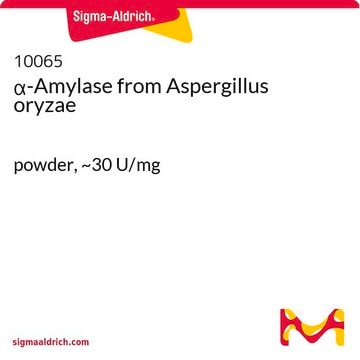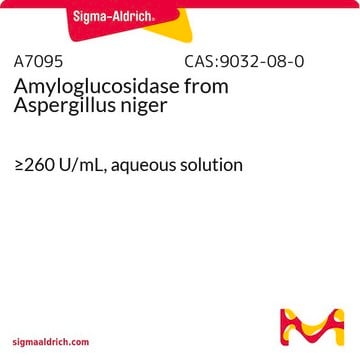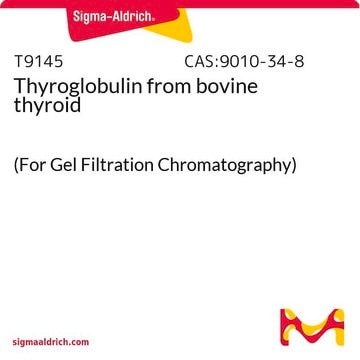A7005
β-Amylase from sweet potato
Type I-B, ammonium sulfate suspension, ≥750 units/mg protein (E1%/280)
Sinónimos:
1,4-α-D-Glucan maltohydrolase
About This Item
Productos recomendados
biological source
sweet potato
Quality Level
type
Type I-B
form
ammonium sulfate suspension
specific activity
≥750 units/mg protein (E1%/280)
greener alternative product score
old score: 57
new score: 1
Find out more about DOZN™ Scoring
greener alternative product characteristics
Waste Prevention
Safer Solvents and Auxiliaries
Design for Energy Efficiency
Learn more about the Principles of Green Chemistry.
sustainability
Greener Alternative Product
concentration
≥7.0 mg/mL
greener alternative category
storage temp.
2-8°C
¿Está buscando productos similares? Visita Guía de comparación de productos
General description
Application
- in the hydrolysis of starch and starch-pectin combinations
- for comparing amylases from different sources in Staphylococcus aureus SH1000 biofilm inhibition and reduction assay
- for selenium speciation in samples
Biochem/physiol Actions
Unit Definition
Physical form
Other Notes
signalword
Danger
hcodes
pcodes
Hazard Classifications
Resp. Sens. 1
Storage Class
11 - Combustible Solids
wgk_germany
WGK 3
Certificados de análisis (COA)
Busque Certificados de análisis (COA) introduciendo el número de lote del producto. Los números de lote se encuentran en la etiqueta del producto después de las palabras «Lot» o «Batch»
¿Ya tiene este producto?
Encuentre la documentación para los productos que ha comprado recientemente en la Biblioteca de documentos.
Los clientes también vieron
Artículos
Instructions for working with enzymes supplied as ammonium sulfate suspensions
Protocolos
Beta-amylase is found in bacteria, fungi, and plants. To measure β-amylase activity, this assay uses a colorimetric spectrophotometric stop reaction at 540 nm.
Beta-amylase is found in bacteria, fungi, and plants. To measure β-amylase activity, this assay uses a colorimetric spectrophotometric stop reaction at 540 nm.
Beta-amylase is found in bacteria, fungi, and plants. To measure β-amylase activity, this assay uses a colorimetric spectrophotometric stop reaction at 540 nm.
Beta-amylase is found in bacteria, fungi, and plants. To measure β-amylase activity, this assay uses a colorimetric spectrophotometric stop reaction at 540 nm.
Nuestro equipo de científicos tiene experiencia en todas las áreas de investigación: Ciencias de la vida, Ciencia de los materiales, Síntesis química, Cromatografía, Analítica y muchas otras.
Póngase en contacto con el Servicio técnico













